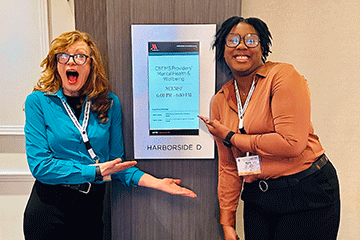News Detail
03/19/2024

SUNY Cortland junior Kyla Young combined her love for helping people during campus emergencies with original research about mental health challenges facing college first responders that recently earned her a speaking engagement at a national conference.
“You have to be brave. Don’t share your feelings,” explained Young, a biomedical science major from Brooklyn, N.Y., who serves as crew chief of SUNY Cortland’s volunteer EMS, SUNY Cortland Emergency Medical Services. “You don’t say how you’re doing after a call. You go through the most traumatic things and are like, ‘Alright, well, time for the next one.’ You’ve got to get on the truck and go back out.”
Young, a certified emergency medical technician (EMT) who also works for a local ambulance agency, TLC, covering Cortland’s surrounding areas, presented her findings in February at the National Collegiate Emergency Medical Services Foundation’s Conference (NCEMSF) in Baltimore, Maryland.

The conference is the largest gathering for college-based emergency medical service (CBEMS) providers in the country. According to Young, up to 3,000 people attended the event.
Young’s co-presentation with Jena Curtis — SUNY Cortland health professor and mentor to Young’s research — was well received and the discussions following the presentation could lead to furthering this research in the future.
“I think that seeing statistics and data about college EMS providers and being able to identify with the material made the students think about the mental health and well-being of their members and their own,” Young said.
In general, EMS providers feel they don’t always have the time or outlets to process all they experience on call, Young explained. She also said there is a belief that the constant stress of the EMS lifestyle and the need for coping mechanisms may lead to poor mental health and unsafe behavior.
“Everyone always thinks (of professional EMS workers in general), ‘They’re alcoholics. They smoke and they do recreational drugs. They’re sleep-deprived and don’t eat well,’” she said.
At the conference, Young summarized her conclusions about the overall health and well-being of students who provide campus EMS services and encouraged attendees to spread her one-sentence takeaway for them: “Oh, well, I’m not doomed.”
“College students have a big thing about being stressed and having anxiety and mental disorders,” Young said. “And EMS providers, in general, have those same things. So, if you look at the cross-section between it, how does that compare?”
Young continued, “Is it that (students) have less chance of getting a mental health diagnosis because they’re in college-based EMS? Or is it higher because they have to deal with schoolwork? Someone had to explore it.”
The desire to understand that distinction catalyzed Young’s research.

Last summer, the SUNY Cortland Undergraduate Research Council granted Young a stipend to complete her research. Along with Curtis, the pair collected data from CBEMS providers around the country that fueled their presentation.
“I didn’t think I’d get accepted,” Young said of her invitation to co-present with Curtis. “(The conference) doesn’t really invite students; they have a separate event for students.”
“Very few undergraduate students get to initiate ground-breaking research projects that have real-world impacts on their future professions,” Curtis said.
“This research only happened because Kyla was personally and professionally interested in supporting the well-being of collegiate EMS, and because SUNY Cortland has such strong support for undergraduate research.”
When Young isn’t responding to emergencies or working on her research, she has responsibilities around campus. Enrolled to earn 18 credit hours this semester, Young is an admissions tour guide, CPR instructor and president of the Minority Association for Pre-Medical Students club.
With so much on her plate, Young questioned how CBEMS providers’ mental health fares against those of full-fledged EMTs.
“Hearing what people had to say makes me want to continue to do research like this and try programs and protocols to increase mental health and wellbeing at different agencies,” she said.
For Young, the next step is having her research published in NCEMSF’s journal. A Ph.D. may be on the horizon, increasing her credibility and allowing her to create widespread mental health improvements in emergency medical services.
Prepared by communications writing intern Jean-Andre Sassine Jr. '23

